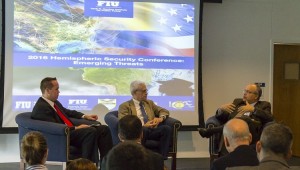National security experts from FIU and throughout the Western Hemisphere shared their views on global terrorism, violent extremism and other emerging threats in the region during a day-long conference sponsored by the Jack D. Gordon Institute for Public Policy and the Kimberly Green Latin American and Caribbean Center.
The first Annual Hemispheric Security Conference brought together a diverse group of panelists from the United States, Canada and Central America, as well as representatives of the U.S. Southern Command, the U.S. Army War College and two former deputy assistant secretaries of defense for the Western Hemisphere under Presidents George W. Bush and Barack Obama.
“It’s my honor to share the stage with two of the greatest U.S. defense policy makers for the Western Hemisphere,” said Brian Fonseca, director of the Gordon Institute and a former defense intelligence analyst for the U.S. Southern Command. “The purpose of this is to [come up with] unscripted questions, the more provocative the better.”
Fonseca was joined by Stephen Johnson and Frank Mora, both former deputy assistant secretaries of defense. Mora is also director of FIU’s Latin American and Caribbean Center. The pair discussed the threats they dealt with during their tenure, as well as the policy options available to them during their respective administrations.
“Certainly, they were not the threats we face today and perhaps not as great as the threats we’re facing right now,” said Johnson, who served under President Bush. “We were coming out of the Cold War and we were coming out of an initiation in counter-narcotics and then, all of a sudden, September 11th happened and, despite President Bush’s claim to make this the “Century of the Americas,” we were suddenly in a global war with terrorism. That clearly sucked most of the air out of the room.”
During Johnson’s time in the administration, external players like Russia and China also were becoming more active. Fonseca inquired about potential threats currently coming from these countries.
 “Our engagement has to be about us, it can’t be about what others are doing,” said Mora, who served under President Obama. “I don’t want to diminish the influence or the power that Russia represents, certainly if I was in Eastern Europe I’d be concerned, but I don’t see any evidence that the Russians can really exercise influence and leverage in a region other than trying to sell military wares. Let’s not be reactive. Let’s not go into a panic and exaggerate that kind of threat because it’s not there.”
“Our engagement has to be about us, it can’t be about what others are doing,” said Mora, who served under President Obama. “I don’t want to diminish the influence or the power that Russia represents, certainly if I was in Eastern Europe I’d be concerned, but I don’t see any evidence that the Russians can really exercise influence and leverage in a region other than trying to sell military wares. Let’s not be reactive. Let’s not go into a panic and exaggerate that kind of threat because it’s not there.”
More than 120 students, faculty and security officials from throughout the Western Hemisphere attended the Annual Hemispheric Security Conference sponsored by the Jack D. Gordon Institute for Public Policy and the Kimberly Green Latin American and Caribbean Center.
In terms of the Chinese, Mora said he thinks that they are a much more strategic country than the U.S. tends to be.
“I think that what the Chinese are doing in the region is really a call for us to do better,” he said. “How do we engage? How do we compete? How do we do the things internally that would make us, if you will, the partner of choice? There’s a difference between a blind spot, not doing anything, and running into a panic. Neither is a good idea. You’ve got to find somewhere in the middle here that I think is more effective.”
The hour-long talk was followed by questions from the audience, in which the pair discussed the policy, tools and instruments they used during their tenure, as well as their views for the future.
“A threat can be anybody sitting someplace with, on one hand, a dirty bomb or, on the other hand, someone who knows how to hack into complex Internet systems,” said Mark B. Rosenberg, president of FIU, in his opening remarks.
“Today, we have a discussion that ranges across a variety of different levels of threats to our security. So many of our students have come out of the conflicts, the juxtapositions, the difficulties that have arisen over the years because of these threats, both at the state and non-state level. I couldn’t be happier that we’re going to have that conversation here. We’re the shape of things to come.”
To view pictures of this event, click here.
via FIU News

